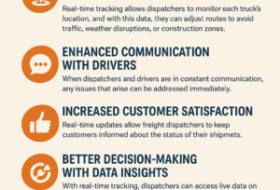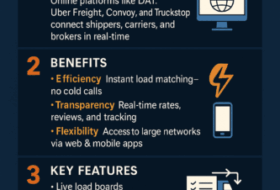Are you a Freight Broker or Dispatcher?
Freight Broker
Freight brokers work with both shippers and carriers and serve as the middle man. Many freight brokers make money by negotiating rates with shippers and negotiating a different rate with carriers. The difference between the two rates is the freight broker’s commission. As a result, freight brokers are motivated to encourage shippers to pay high rates while offering carriers a rate that helps them make a profit. If you do not have good negotiation skills, knowledge of pay rates in certain lanes, and know your operating cost when dealing with a freight broker, it is easy to accept loads that can sink your business. It is important to be very selective when choosing a broker (some are more motivated by profit than others). If the freight broker also offers quick pay, they take another percentage from the carrier’s agreed upon rate.
Example
X Shipper has an open load and reaches out to Y Broker to find them a carrier. X Shipper and Y Broker agree on a rate of $2,000. Y Broker then reaches out to ABC Trucking about the open load. Y Broker is not required to disclose the originally negotiated amount to ABC Trucking. As a result, ABC Trucking agrees to haul the load for $1,600. Y Broker keeps the $400 difference as commission.
ABC Trucking also uses Y Broker’s Quick Pay option, which takes 2% out of the $1,600. The end result is ABC Trucking receives $1,568 for a load originally negotiated for $2,000. Y Broker makes $432.
Dispatcher
Dispatchers represent the carrier when negotiating freight. They take a percentage off the carrier’s negotiated rate, so they are motivated to find carriers high paying freight. The higher the rate they can find for the carrier, the more money they make. Good dispatchers will keep portfolios with their carrier’s lane preferences, desired freight rates, and equipment specifications. Using this information, the Dispatcher then contacts the shippers or freight broker on the carrier’s behalf to negotiate loads that meet the carrier’s requirements. Only after a load is agreed upon does the dispatcher charge the carrier a fee for the service. Also note, if the carrier uses factoring, many dispatchers will create and submit invoices to the factor on the carrier’s behalf. However, all dispatchers are not created equal, as some will charge additional fees or make you book a monthly minimum. As always, be sure to ask those questions before hiring a dispatcher or signing a contract.
Example
Let’s continue with the example above. X Shipper agreed on a rate of $2,000 with Y Broker. However, this time instead of using Y Broker directly, ABC Trucking is using Z Dispatcher to find freight. Z Dispatcher knows ABC Trucking needs to make at least $1,600 on the load to stay in business, and also has knowledge of what each load should pay. Z Dispatcher contacts Y Broker about the open load. Y Broker offers the load at $1,600, but Z Dispatcher declines the offer. The two negotiate until Y Broker agrees to a $1,800 rate. Z Dispatcher contacts ABC Trucking about the load and ABC Trucking agrees to haul it. Z Dispatcher charges ABC Trucking a 5% fee. When everything is done, ABC Trucking pockets $1,710, Z Dispatcher makes $90, and Y Broker receives $200.
Which One Should You Use?
There are positives and negatives to both options.
Freight Brokers – Convenient and Easy to Use, But Motivated to Offer Lower Rates.
Freight Brokers tend to have close relationships with shippers instead of working for offload boards, so they are convenient to use. However, they make money by offering carriers low rates. Their goal is to find the fine balance between offering carriers lower rates while also enticing carriers to continue taking loads directly from them. Some brokers are better to work with than others.
Dispatchers – Motivated to Find You the Best Paying Freight, But Usually Works Through Intermediaries As Well.
Dispatchers work closely with carriers to find them the best freight rates. However, most dispatchers work with freight brokers or load boards to find freight; if you find one that works directly with a shipper, that’s great! Remember, dispatchers do not make money unless you do, so a dispatcher’s goal is to negotiate the highest paying freight possible. Source:https://www.tafs.com/freight-broker-dispatcher-difference/
15% OFF Packages above Basic.









